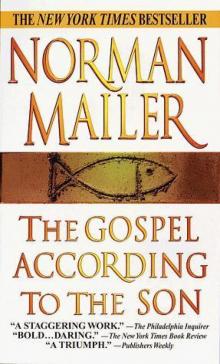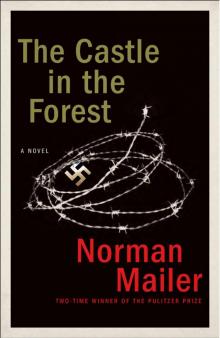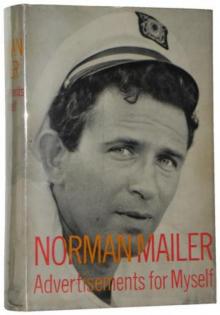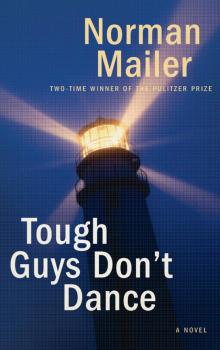- Home
- Norman Mailer
The Deer Park Page 30
The Deer Park Read online
Page 30
I had found the orphanage again and I was home; I might just as well never have left home. After work, after my meal in the expensive drugstore, I would go back to my furnished room and I would bathe—what luxuries have the poor—and lie naked and powdered on my bed, covered with heat rash, reading the newspaper until I fell asleep. That way I passed three or four weeks, my mind sleeping on pointless calculations. I would spend an hour going over my budget, deciding on any particular night that I could reduce my expenses to no less than thirty-four dollars a week, which meant after all the pieces were taken from my pay, that I could never bank more than fifty dollars a month. So it would be six hundred dollars saved in a year, and after six years and eight months of dodging lobsters, I would earn back what I had lost in twelve days with Lulu, and this thought gave me a sort of melancholy glee, allowing me to relish like a saint counting his sores, how hard the work would be tomorrow.
It was all my doing. I still had most of my three thousand dollars and I did not have to work, but with Lulu gone, there was no other choice than to sit down and begin the apprenticeship of learning to be a writer. Feeling the fear this ambition gave to me, I was ready to fly anywhere, to the Equator if necessary, but one can always find the Equator, and I did not have to take a step from Desert D’Or. Waiting for me was the stinkhole and the furnace at the back of my modern restaurant, and I buried myself for a week, and another week, and five weeks after that, mortifying my energy, whipping my spirit, preparing myself for that other work I looked on with religious awe, while all the time, romance being the hardiest of the weeds which grow in a home for orphans, I never could rid myself of the sweet idea that one day Lulu would come to the restaurant, she would blunder back to the kitchen, she would see me in my dishwasher’s apron and begin to cry, she would love me as she never had before, and the essence of magic would be tasted: you dropped to the bottom only to gain momentum for the leap to the top.
It could not go on forever. My fairy tales began to dissolve in the gossip columns, and each night I tickled my prickly heat by forcing myself to read the film news from the capital. There were many reports of Lulu’s marriage, and columnists were fond of calling it “The Love Match of the Year.” Those fan magazines which had not been embarrassed by signed articles: “Why I Dream About Teddy Pope And Me—by—Lulu Meyers,” could afford to give space to the big piggy bank of Tony and Lulu Tanner. The story, gelded by the memorable prose of those magazines to the use of the word “kiss,” declared that every time Tony “kissed” Lulu, or Lulu “kissed” Tony, the winner of the bonanza would drop a coin in their piggy bank. “It fills up so quickly,” Lulu said or her press agent said, “that Tony and I are always running short of small change.”
How true it all was, or at least how partially true, I could not know, for once I took the job, I buried myself and never went to see Eitel or Faye or Dorothea or anyone I knew in the resort. The result was that I believed the gossip columns and the surprise was that it cured me of magic; I even began to think of quitting my job and starting to write, and finally one evening I went to see Eitel.
I had supposed that everything would be the same. Nothing had happened to me, and so I could not feel that anything had happened to anyone else. At most, when I thought of Eitel and Elena I saw them eating at a quiet table in my restaurant, or Dorothea and Pelley on a carouse, or Marion making a contact. More than that had happened, however. The night I visited Eitel, he was beginning the job of moving his belongings from Desert D’Or to the capital. He had broken up with Elena, he told me, and she was living now with Marion Faye.
In the hours we sat drinking, I got the story from him and I hated to hear what he told me. There was nothing left of him nor anyone else, and I heard details which were very close. It was all his fault, he began by saying. After Dorothea’s party, he knew that he would have to make up his mind about the offer from Crane. He could not postpone a decision much longer and there were only two choices. He could stay in Desert D’Or and continue to be the black-market thoroughbred of Munshin’s secret stable, or he could go back to the capital. But to go back with Elena did not seem plausible; she was hardly the mate for a commercial man. So his thoughts without any hint of something new chased themselves around the old circle, and after the night Eitel wept in her arms, he lived in constant distrust of the tenderness he felt for her.
That he knew the morning he picked up the phone, heard Beda’s voice, and realized how careful he had been to forget the conversation they had had the night of Dorothea’s party. But it was hardly possible to forget it now. Into his ear came Beda’s voice. “Look, baby, I’m putting it to you. Sans façons, will you and Elena come over tonight?”
“Who will be there?” asked Eitel.
“Sans façons, I said. Zenlia is getting to be a bore talking about the lush virtues of Elena.”
Eitel was agitated. “Look, I’ll call you back,” he said. “I want to talk it over with Elena.”
Her reaction surprised him. He had expected, he realized, that she would refuse the invitation, but instead she acted kittenish. “What do you think will happen there?” she giggled and added just a trifle seriously, “What are we supposed to do?”
“You’re not signing a contract to do anything.”
“I feel funny, Charley.”
“So do I.” He shrugged casually. “Let’s not go,” he said and felt a certain tension to prepare himself against disappointment if she should agree.
Elena merely looked thoughtful. “Do you think that wife of his is attractive?”
“Well, she’s certainly handsome,” Eitel said, “but I can’t say she’s my type.”
“What a liar you are.” Elena’s face was cheerful. “I think Don Beda is very attractive,” she said, thereby startling him. “But of course not as much as his wife.”
“Of course not.”
“You’re angry and I was just warning you,” she teased.
“I’m not angry,” he insisted.
“If you want to go, I’ll go,” Elena said. “But I think we’re crazy.”
He made a call to Beda, and for the rest of the day found himself in a curious excitement. From the past came a memory. When he was thirteen or fourteen he had kissed a girl for the first time, and before he said good night he begged a promise from the girl to see her the next evening. All the following day he walked the streets troubled and excited, feeling that life itself was there before him like a banquet of surprises. He had been in a flurry waiting for evening to come.
Now, he could feel the echoes of that emotion, and the day passed with a feeling that he was young again. It was marred only by Elena’s silence. What a depressing woman she was, he told himself angrily. Certain enough, just as they were getting into his car, she turned to him, a wifely hand on his arm, and said, “Charley, maybe this is a mistake.”
“What a time to decide,” he groaned.
“You want to go, don’t you?”
“Let’s call them up. It doesn’t mean all that to me.”
She looked unhappy. “I’m not being a prude,” she said. “It’s just that it would be better if it didn’t feel so planned, I mean if it just happened.”
“You told me you used to do things like this to make your psychoanalyst think you were more interesting. What’s more planned than that?”
“I was immature then,” Elena said. “Besides I didn’t really enjoy it, not really. It’s only with you, I can.” She kissed him softly on the cheek. “Charley, I want you to promise tonight won’t make any difference between us.”
“We don’t even know that something is going to happen.” With that, he kicked the starter of his car and they were off.
For a while that evening at Beda’s, it looked as if nothing would happen. During several hours they merely sat around and drank, and it was not pleasant drinking. Zenlia was sullen. She would smoke a cigarette out of a long holder, she would blow smoke into the air, and smile distantly at something clever that Eitel or Beda might say
.
But as Elena got drunk, she turned merry. Beda was giving her compliments, and under the praise she grew more sure of herself, she began to make little remarks which Eitel had to admit were charming. Her green eyes had light in them, her lips were moist and separated, and her skin glowed against her dark dress. Eitel contributed a word from time to time and tried to catch Zenlia’s eye. She seemed indifferent to him; for that matter she seemed indifferent to everyone but Elena. One of the few times Zenlia spoke, it was to say in her clear precise voice, “You act like a dear cousin of mine, Elena.”
“I do?” Elena asked cautiously.
“Yes,” Zenlia said with a bored proud look, “my cousin has rather an intense grace.”
“Well, I have rather an intense disgrace,” Elena said in a surprisingly comic English accent.
When all four laughed for the first time that night, Eitel could feel her blossom.
After that, the atmosphere changed. Beda began to dance with Zenlia, then with Elena, then he passed around a stick of tea. “Prime Mexican pot,” he told them with a wave of his hand. Only Eitel refused to smoke. Another round, and Beda said in a tenor voice, “Everybody’s in a balling mood, thank God,” putting a period to the preliminaries.
Eitel wore the horns that night. There was nothing he could do about it—he was in a panic. After a while the party moved away from him, and he gave up and sat in a chair alone, smoking a cigarette, sipping a drink, trying to soothe the beating of his heart. Everything seemed to take hours.
It came to an end. Elena saw him sitting by himself, and she walked over unsteadily and asked, “Do you want to go home?”
“No, not until you do.”
“Well, I do now.”
They said good-bye at the door as if they had been playing bridge for the evening, but before they drove away Eitel could hear the sound of laughter behind the fence which enclosed the patio of Beda’s house.
On the ride he was silent, and when Elena put a shy hand on his leg he remained immobile, neither giving himself to her by so much as the width of a hair, nor drawing away. It was the same when they went to bed. He lay on his back, his eyes watching the ceiling so carefully that he felt at last as if he could see in the dark. Elena stirred restlessly. She sighed once or twice. He could sense how she hesitated to speak, formed words, and then was silent. When her hand touched his, and her fingers tried to squeeze his palm, he stiffened all over his body.
“Don’t touch me,” he said to her in the darkness.
“Charley …” she began.
“I’m trying to sleep.”
“You wanted to go,” she said mildly, carefully.
“I didn’t know what a stinking brutal bitch you are,” he heard himself whispering.
“Charley, I love you,” she said.
“Love me? You love everything,” he said. “A gorilla, a hyena, a four-eyed horse.” But he had only begun. “You love me,” he repeated, “yes, you certainly do when you can give your yelps and yowls to any two-bit dog.” He was trembling.
“Charley, it wasn’t the same,” she said in a small voice. “I don’t love them. It’s just a cockeyed part of me.” She was beginning to cry. “Charley, don’t turn on me,” she said. “I love you. I’m the only one who does.”
“Love, Elena?” he said. “Love is just a big noise.”
What he could not bear was the thought that she did not love him completely, without thought or interest in anything else alive.
“Oh, you’re cruel,” she said.
“Cruel?” he exclaimed. “Why, I’ve been taking lessons from you.”
“All right, Charley,” Elena said, sitting up in bed, her face filling with hard wisdom and hatred of him, until she was beautiful to his eyes, and more than a little frightening. “Now, you listen to me,” she said. “You were the one who arranged everything tonight, and yet you call me a pig. If it had turned out better for you, you would be loving me all over again, you would be telling me how wonderful I am.”
He was weary, he was exhausted—a defeated man cannot be asked to have the moral bravery of a victor. So Eitel turned on Elena, and in his best accent he said, “Must you worship stupidity as if it were your patron saint?”
She wept then. He could hear her struggle to keep her grief, and in the darkness each small sound she made, for she never wept loudly, became swollen in his ear. He heard her slip out of bed, grope her way to the bathroom, felt like a whip against his eyes the glare of the bathroom light before she closed the door, and then he was alone, left with nothing but his rage, his cold animosity, and the knowledge that Elena was crying, her chilled feet standing against the stone of the bathroom floor. Eitel tried to shut her from his mind, and all the while his own feet chilled, his body shuddered from cold perspiration. “I’ll never touch her again,” he swore, and even as he was swearing, he knew he could not leave her alone in the bathroom crying into the hard face of the mirror, the tile, and the chromium. “It really is my fault,” he thought, and he got out of bed and went to her. She trembled in his arms, her body was ice, and for minutes while he soothed her and tried to calm her weeping, his anger buried in the tenderness he felt he had to offer, he could do no more than say, “It’s all right, baby, it’s all right.”
She seemed almost not to know that he was there. “Oh, Charley, you must forgive me,” she wept at last. “I kept thinking you would never talk to me any more, and you see, there’s nothing, there just isn’t anything when I begin to think … I mean, without you. Oh, Charley, forgive me. I swear I’ll make it up to you, I’ll spend the rest of my life.” She was babbling now. In another moment she would be hysterical. But as if it were too important to bury herself in hysteria, to leave one thing she must say unsaid, he could feel her clutching him like a brokenhearted child. “You see,” she hiccupped, her sobbing uncontrollable, “I got that way because, oh Charley … they liked me, and I was the center of attention.”
Then he hugged her to him, led her back to the bedroom, and exhausted she fell asleep in his arms while he whispered to her, “It’s all right, baby, do you hear, it’s all right,” whispering it even after she had fallen asleep, whispering it into the darkness while the chorus of what she had said, “I was the center of attention … I was the center …” played its long record into his sleep and into his dreams. He almost felt happy. He had learned how he valued her. Yet the stern taskmaster of his conscience knew that he had denied Elena a most valuable opportunity to grow because he had called her stupid at the instant when she had been most perceptive of his character. So, if he hugged her to him now as a naughty but pardoned child, he fell asleep nonetheless with a deep sorrow.
All next day he felt the vulnerability of his body as though he had been flogged with the rung of a chair. It was only after quarrels or crises that he could feel love for Elena the way he desired. Yet at the edge of this emotion he was surprised at himself. Was the memory to be cured so easily?
Eitel learned. Everything was all right until they tried to make love again. Then, Elena was far away, and it was no better for him. He hated her. It was impossible not to remember how she had given herself to the others, and whatever expression might cross her face became deformed to him and infected the past until he saw beyond Beda the legion of her numberless lovers to whom she had probably given herself in exactly this way. Thus, losing the pride that it was he who gave her everything, that there was finally something worth while about himself, Eitel was stripped; he had never felt so small.
Elena sensed it of course. She was tense and difficult and her attempts to stir herself offended him. For all the minutes they would try he could hear nothing in his brain but, “Love, love is a big noise,” and he felt it spreading from him like a poison fog which must turn bone to rubber, and spirit to glue, so that he not only hated her and hated himself but the life of everything. What seemed most odious to him was that they had been tender to each other, they had forgiven one another, and yet he did not love her, she did not love hi
m, no one ever loved anyone. These things he would think and afterward would lie beside her, even caress her with a cunning which asked no more than that she not make a scene. And each night, or almost every night for a week, Elena would encourage him to love her and then would lie stiffly, while he knew she was thinking of all he had said in his rage. He would even tell himself that she had developed since he had known her; in their first weeks together she could not have gone a day like this, and now she had managed a week.
During that time, he finished his script. Through all of the new draft, he had been dreading to do the scene where Freddie returned to the seminary and the story was finally wrapped in the chorus of angels’ voices. Eitel had no conceit that he was writing his original story; he knew too well how clever was the new script, how effective, how brilliant of its professional sort, but there was the problem: it was so well done in its own way that the end could not be too artificial; as a commercial script it needed its own kind of false sincerity, and he had not been able to imagine how he would do it. But the last scene turned out perfectly; it was a marvel; he admired the way he wrote so well about things he did not believe at all. Eitel felt powerful.
The script, he had decided, was much too good to give to Munshin on the terms they had made, and therefore it was time to alter the contract. Sitting at his desk, working for Collie’s profit, his mind would come back to Crane, and like a salesman with his samples at the door, he would tell himself all the arguments: for a man who had been indifferent to politics these ten years it was a waste to be stubborn. The names he hated to give were the names of men who had talked against his own name; in the last months, if he had learned nothing else, he had learned that he was not an artist, and what was a commercial man without his trade? The arguments knocked at the door, they tipped their hat and came inside to leave a sample, departing with the promise they would be back again.
Eitel wrote a cautious letter to Crane, explaining that soon he might be ready, and when one of the regular phone calls came from Munshin, Eitel told him it would be weeks before he could finish the script.

 Ancient Evenings
Ancient Evenings The Gospel According to the Son
The Gospel According to the Son Oswald's Tale: An American Mystery
Oswald's Tale: An American Mystery The Castle in the Forest
The Castle in the Forest The Executioner's Song
The Executioner's Song Why Are We in Vietnam?
Why Are We in Vietnam? The Deer Park: A Play
The Deer Park: A Play An American Dream
An American Dream Why Are We at War?
Why Are We at War? The Time of Her Time
The Time of Her Time The Spooky Art: Thoughts on Writing
The Spooky Art: Thoughts on Writing Miami and the Siege of Chicago
Miami and the Siege of Chicago Mind of an Outlaw: Selected Essays
Mind of an Outlaw: Selected Essays Barbary Shore
Barbary Shore The Fight
The Fight Harlot's Ghost
Harlot's Ghost Tough Guys Don't Dance
Tough Guys Don't Dance Of a Fire on the Moon
Of a Fire on the Moon The Spooky Art
The Spooky Art The Deer Park
The Deer Park On God: An Uncommon Conversation
On God: An Uncommon Conversation Mind of an Outlaw
Mind of an Outlaw Oswald's Tale
Oswald's Tale